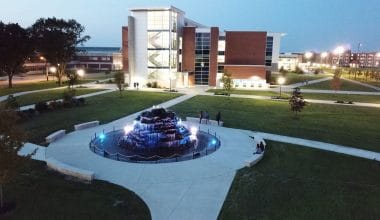It was Shelby Foote who said that a university is just a group of buildings gathered around a library. In choosing a University in Boston make sure the university is right for you. A university is a step further for you not just in your future career, but in a step further in your life as a person. The degree you earn from the university is also what guides your career path along the way.
Universities in Boston have not just a reputation, but also the recognition that they have worldwide. These 15 top universities in Boston in 2024 are a great way to start.
Table of contents
- What makes a Top University in Boston?
- Why do I need to attend one of the top universities in Boston?
- Requirements for Enrolling in the Top Colleges in Boston
- 15 Top Universities in Boston
- 1. Harvard University
- 2. Massachusetts Institute of Technology (MIT)
- 3. Boston University
- 4. Tufts University
- 5. Northeastern University
- 6. Boston College
- 7. Brandeis University
- 8. University of Massachusetts, Boston
- 9. Suffolk University
- 10. Simmons University
- 11. Worcester Polytechnic Institute
- 12. University of Massachusetts- Amherst
- 13. Clark University
- 14. University of Massachusetts–Lowell
- 15. Western New England University
- Frequently Asked Questions
- Conclusion
- References
- Recommendations
What makes a Top University in Boston?
In Boston, there are several universities. What makes the best is a matter of fact and the quality it confers on students. Some of the things that make a top university in Boston one are-
The reputation the university has on a worldwide basis. The reputation of the university you attend in Boston has a huge impact on your future. In the employment sector, having a university with a good reputation in your CV makes you stand out. “U.S. News” methodology counts reputation as more than 20 percent of a college’s ranking score.
Reputation is solidified by the success of both researches at the school and graduates coming out of it. In “U.S. News” rankings, reputation is established mainly by surveys completed by top university administrators nationwide, including college presidents and deans of admissions. The top universities in Boston in 2024 have this worldwide recognition and reputation.
The top universities in Boston have a certain similar feature to them- selectivity. They are the best, so they tend to receive many applications every year. As such, the more applicants it receives, and the greater ability it has to recruit impressive students and to cultivate a selective and diverse student population. To get into any of these top universities in Boston, you need to have impressive resumes and SAT or ACT scores and are usually at the top of your high school class.
The top universities in Boston have significant funding from a lot of sources. Funding is given to the top schools in Boston so that they can be able to spend more on its students, professors, research, facilities and instruction.
In the top universities in Boston, the teachers and professors employed are at the top of their fields. This is necessary to ensure the students get as much knowledge base as possible. These faculties then study and create at the university, generating money and prestige. Top universities in Boston recruit great professors by offering competitive salaries and a rich academic community for colleagues and students.
In top universities in Boston, the class size and student-to-faculty ratio are also important factors. The universities make it a duty to ensure that the class sizes are small to ensure every student benefits adequately from what is being taught.
The top universities in Boston have accreditation. Accreditation is very important, especially if you want financial aid. Accreditation is also important for when you are seeing employment. Your employers are most likely to look out for your school’s accreditation status.
You must also know that the top universities in Boston are quite expensive. According to “Forbes,” nearly all students at for-profit colleges take out loans, and they are eight times more likely to incur over $20,000 in debt when compared to public community college students. Data from The College Board shows that from 2010 to 2011, the average price of a year at a public two-year college was about $2,700, compared to nearly $14,000 at a for-profit institution. The average price at a public, nonprofit school was about half the cost, around $7,600.
SEE ALSO: Best Universities In Ireland for International Students 2024| Ranking
Why do I need to attend one of the top universities in Boston?
If you’ve not seen a need to attend one of the top universities in Boston, then these next few lines will convince you. The reasons include the following:
- Rigorous academics- In terms of academics, the top universities in Boston take academics seriously. With more than 300 programs of study and great academic flexibility, you can maximize the value of your degree.
- Global recognition- The top universities in Boston have mostly been named to the Association of American Universities (AAU); a prestigious association of top research universities in the United States and Canada.
- Real-world experience- In Boston, there are a lot of unexplored opportunities. By attending any of the top universities, you can spread your wings and be ready to fly. You would be sent across the country for internships and for research purposes. The universities in Boston make studying thrilling.
- A bright future- Universities in Boston already have a global recognition. By attending them, you can be sure your degree would open doors for you. Graduates from universities in Boston are ranked #14 in the US for employability.
- A residential campus- From historic brownstones lining Bay State Road to modern high-rises overlooking the Charles River to residence halls with dedicated specialty floors, Universities in Boston provides a variety of living communities.
- Perfect class sizes- Universities in Boston have a surprisingly small student-to-faculty ratio and an average class size. You will not only meet award-winning professors; you’ll engage with them.
Requirements for Enrolling in the Top Colleges in Boston
The requirements to successfully get enrolled into the top colleges in Boston are;
- Get the best possible grades during all four years of high school. Grades are extremely important.
- Take academically rigorous classes all four years. You should carry as many challenging courses as you can handle-college prep, Advanced Placement (AP), honors, and International Baccalaureate (IB).
- Practice taking the SAT or ACT. Become familiar with the types of material covered and the test directions. Take the PSAT during your sophomore year. Determine what knowledge and skills you lack and master them for the actual tests. Take advantage of free online SAT or ACT materials, study guides, practice tests, tutors, and prep courses before or during your junior year.
- Try taking both the SAT and ACT. These top colleges will accept either test. You may do better on one test than the other. This will boost your chances for admission. Take the SAT or ACT more than once if you are unsatisfied with your scores.
- Take SAT Subject Tests and AP Tests. Competitive colleges may require you to take some of these exams and they take note of exam results. The best colleges accept only AP scores of five (5).
- Spend sufficient time developing your college essays
- Move up to leadership positions. Volunteer. Get involved in extracurricular activities. Demonstrate growth. Develop a deep interest or talent in one or more areas.
- Get organized and stay focused. Make a file folder for each college that interests you. Keep focused on getting into any of these best colleges in the world.
15 Top Universities in Boston
Boston is home to many universities; however, a few have made themselves the top schools. These schools include:
1. Harvard University
Harvard University is a private Ivy League research university in Cambridge, Massachusetts. The university was founded in 1636 as Harvard College and named for its first benefactor, the Puritan clergyman John Harvard.
Till date, it is the oldest institution of higher learning in the United States and among the most prestigious in the world. Harvard University is devoted to excellence in teaching, learning, research, and developing leaders in many disciplines who make a difference globally. Harvard University is an Ivy League school and very easily one of the best colleges in the world.
2. Massachusetts Institute of Technology (MIT)
Massachusetts Institute of Technology is a private land-grant research university in Cambridge, Massachusetts. Established in 1861, MIT has since played a key role in developing modern technology and science and has been ranked among the top academic institutions in the world.
The close association of industry and research has helped MIT alumni go on to launch more than 30,000 active companies, creating 4.6 million jobs and generating roughly $1.9 trillion in annual revenue.
3. Boston University
Boston University is a private research university in Boston, Massachusetts. BU is nonsectarian, but has a historical affiliation with the United Methodist Church. The university currently has over 4,000 faculty members and nearly 34,000 students, and is one of Boston’s largest employers. It offers bachelor’s degrees, master’s degrees, doctorates, and medical, dental, business, and law degrees through 17 schools and colleges on three urban campuses.
Affiliates of Boston University have won seven Nobel prizes. With over 342,000 alumni, Boston University graduates can be found worldwide. American civil rights movement leader Martin Luther King Jr. earned his doctorate in systematic theology at BU in 1955. After gaining prominence by advocating nonviolent resistance to segregation, he won the 1964 Nobel Peace Prize. It will be one of the top universities in Boston in 2024.
4. Tufts University
Tufts University is a private research university on the border of Medford and Somerville, Massachusetts. It was founded in 1852 as Tufts College by Christian universalists who sought to open a nonsectarian institution of higher learning.
Tufts alumni in the government sector include Admiral James Stavridis, former dean of The Fletcher School at Tufts University and former Commander of Southern Command and Supreme Allied Commander of NATO (M.A.L.D. 1983, Ph.D. 1984); Mulatu Teshome Wirtu (M.A.L.D 1990), President of Ethiopia from 2013 to 2018; Kostas Karamanlis (M.A. 1982, Ph.D. 1984), former Prime Minister of Greece; Shashi Tharoor (M.A. 1976, M.A.L.D. 1977, Ph.D. 1979), former United Nations Under-Secretary-General and Indian Member of Parliament; Daniel Patrick Moynihan (B.A. 1948, M.A. 1949, Ph.D. 1961), Arjun Narasingha KC (Post-graduate Fellowship in International Diplomacy), former Health, Education and Urban Development Minister of Nepal; former-US Senator from New York and US Ambassador to the United Nations; Scott Brown (B.A. 1981), amongst others. It is one of the top universities in Boston in 2024.
5. Northeastern University
Northeastern University is a private research university with its main campus in Boston. Established in 1898, the university offers undergraduate and graduate programs on its main campus in Boston and satellite campuses in Charlotte, North Carolina; Seattle, Washington; San Jose, California; San Francisco, California; Portland, Maine; and Toronto and Vancouver in, Canada. It utilizes a semester-based academic calendar.
Northeastern University’s ranking in the 2024 edition of Best Colleges is National Universities #49. Its tuition and fees are $57,592. At Northeastern University, students gain substantial work experience before receiving their diplomas. More than 90 percent of Northeastern undergraduates complete at least one professional co-op during their college career, working for one of more than 2,000 employers worldwide, such as ESPN and MTV.
6. Boston College
Boston College (BC) is a private Jesuit research university in Chestnut Hill, Massachusetts. Founded in 1863, the university has more than 9,300 full-time undergraduates and nearly 5,000 graduate students. There are over 179,000 alumni in over 120 countries around the world.
Boston College students have enjoyed success in winning prestigious post-graduate fellowships and awards, including recent Rhodes, Marshall, Mellon, Fullbright Churchill, and Goldwater scholarships, among others. BC’s yield rate for Fulbright awards is the highest in the country.
SEE ALSO: 10 Best Universities For Renewable Energy Degrees Program In 2024
7. Brandeis University
Brandeis University is a private research university in Waltham, Massachusetts. Founded in 1948 as a non-sectarian, coeducational institution sponsored by the Jewish community, Brandeis was established on the site of the former Middlesex University.
Among the better-known graduates are co-creators of the television show Friends David Crane and Marta Kauffman, political activists Abbie Hoffman and Angela Davis, journalists Thomas Friedman and Paul Solman, Congressman Stephen J. Solarz, physicist and Fields medalist Edward Witten, mathematician and Abel Prize recipient Karen Uhlenbeck, novelist Ha Jin, political theorist Michael Walzer, actresses Debra Messing and Loretta Devine, and many other famous alumni.
The university has an active student government, the Brandeis Student Union, and more than 270 student organizations. Fraternities and sororities aren’t officially recognized by Brandeis University, as they are contrary to a central tenet of the university, namely, that student organizations be open to all students, with membership determined by competency or interest.
8. University of Massachusetts, Boston
The University of Massachusetts Boston is a public research university in Boston, Massachusetts. It is the only public research university in Boston and the third-largest campus in the five-campus University of Massachusetts system. UMass Boston is the third most diverse university in the United States. The university confers bachelor’s, master’s, and doctoral degrees and also operates certificate programs and a corporate, continuing, and distance learning program.
There are eleven schools and colleges at UMass Boston: The College of Liberal Arts, College of Science and Mathematics, School for the Environment, College of Management, College of Nursing and Health Sciences, College of Public and Community Service, College of Education and Human Development, John W. McCormack Graduate School of Policy Studies and Global Studies, School for Global Inclusion and Social Development, Honors College, and College of Advancing and Professional Studies (CAPS).
9. Suffolk University
Suffolk University is a private research university in Boston, Massachusetts. With 7,560 students, it is the eighth-largest university in metropolitan Boston. The Carnegie Classification of Institutions of Higher Education categorizes it as a Doctoral Research University. Suffolk employs over 900 full-time and adjunct faculty members, who instruct approximately 10,000 undergraduate and graduate students on its Boston Campus.
In 2018 U.S. News ranked Suffolk #177 (tie) in National Universities. In 2009 U.S. News ranked Suffolk in the “top tier of “Best Master’s Universities in the North” and #7 in “Best College: Most International Students” attending master’s programs. The 2015 edition of U.S. News publication ranked Suffolk Law School 20th in the United States for its legal clinics, 13th for its Alternative Dispute Resolution program, and 6th for its Legal Writing. It is one of the top universities in Boston in 2024.
10. Simmons University
Simmons University is a private women focused undergraduate university and private co-educational graduate school in Boston, Massachusetts. It was established in 1899. Simmons University reorganized its academic structure in 2018 to foster interdisciplinary learning and cross-departmental collaboration. Students now explore new inter-professional opportunities and create their own pathways to meaningful work. The New England Commission of Higher Education accredits Simmons University. It is one of the top universities in Boston in 2024.
11. Worcester Polytechnic Institute
Worcester Polytechnic Institute is a private research university in Worcester, Massachusetts, focusing on the instruction and research of technical arts and applied sciences. WPI offers a variety of majors in engineering, science, management, liberal arts, and social science at the undergraduate and graduate level.
It is most well-known for its engineering disciplines and is one of the top-ranked schools to attend for engineering in North America and the world over. Unlike many peer universities, WPI does not combine related departments into colleges or schools.
12. University of Massachusetts- Amherst
The University of Massachusetts Amherst is a public land-grant research university in Amherst, Massachusetts. Founded in 1863 as an agricultural college, it is the flagship and largest campus in the University of Massachusetts system and the first established.
UMass Amherst has an annual enrollment of over 30,000 students and approximately 1,300 faculty members. It is the third largest university in Massachusetts, behind Boston University and Harvard University.
The university offers academic degrees in 109 undergraduates, 77 masters’ and 48 doctoral programs. Programs are coordinated in nine schools and colleges. It is one of the top universities in Boston in 2024.
13. Clark University
Clark University is a private institution that was founded in 1887. It has a total undergraduate enrollment of 2,241 (fall 2020), its setting is city, and the campus size is 50 acres. It utilizes a semester-based academic calendar. Clark University’s ranking in the 2024 edition of Best Colleges is National Universities #103. Its tuition and fees are $50,302.
Clark University in Worcester, Mass., is a small liberal arts institution among 11 other colleges and universities. Together, the schools make up the Higher Education Consortium of Central Massachusetts. All Clark students can get a WOO card: a pass that grants discounts at area attractions, baseball games and the local ski slope, Wachusett Mountain.
SEE ALSO: Best University Of Florida UF Volunteering Opportunities In 2024
14. University of Massachusetts–Lowell
The University of Massachusetts Lowell is a public research university in Lowell, Massachusetts, with a satellite campus in Haverhill, Massachusetts. It is the northernmost member of the University of Massachusetts system and has been regionally accredited by the New England Commission of Higher Education since 1975.
Total enrollment for the 2019-2020 academic year is 18,338, including 2,481 online and continuing education students. In the following academic year, about 18,400 students enrolled this fall, making the largest student body enrolled. In-state enrollment represents 88.3 percent of undergraduates and 58.4 percent of graduate students. International students comprise 3.5 percent of the undergraduate population and 16.2 percent of the graduate population. Students of color represent 36 percent of the total undergraduate and 25 percent of the graduate population.
15. Western New England University
Western New England University is a private university in Springfield, Massachusetts. Academic programs are provided through its College of Arts and Sciences, Business, Engineering, School of Law, and College of Pharmacy and Health Sciences.
Western New England University has 43,000 alumni who live and work worldwide. The Western New England University School of Law has over 7,000 alumni, while the MBA and MSA programs have nearly 6,000 alumni. For the 2012-2013 academic year, Western New England University enrollment was 3,800 students. Undergraduate enrollment totaled 2,520 students; approximately 61 percent are male and 39 percent female.
Frequently Asked Questions
Every school has its entry requirements. Ensure you know the requirements for the school you are applying for.
Harvard University, Massachusetts Institute of Technology (MIT), and Boston University.
No. Most of these universities are publicly owned.
No. There is no age limit for applying to any of the top universities in Boston.
Yes. Make inquiries from the school to know the next step you should take towards this.
Conclusion
It is important to know that you have chosen the right university. Universities in Boston are generally regarded as “good”. Make sure you pick a school that would be worth it in the long run. Remember the school would reflect who you are on a bigger scale.
If your school has a good reputation, it would make you more employable and put stars in your C.V. These top universities in Boston are highly rated. You should start here in your search for a good university to attend.
References
- forbes.com/2009/08/10/world-class-best-university-ranking-world-bank-opinions-colleges/
- universityguru.com/universities-boston
- timeshighereducation.com/world-university-rankings/boston-university/
- universityguru.com/universities-boston
- usnews.com/best-colleges/




